Eco Trends & Innovations
15 mins read
Rita Idehai, on Waste, Work, and Driving Social Impact in Nigeria
By Sybil Fekurumoh
October 31, 2025
Through Ecobarter and its fashion arm, Wrep, Rita Idehai is transforming plastic waste into fabric, and creating new pathways for women and communities to thrive.
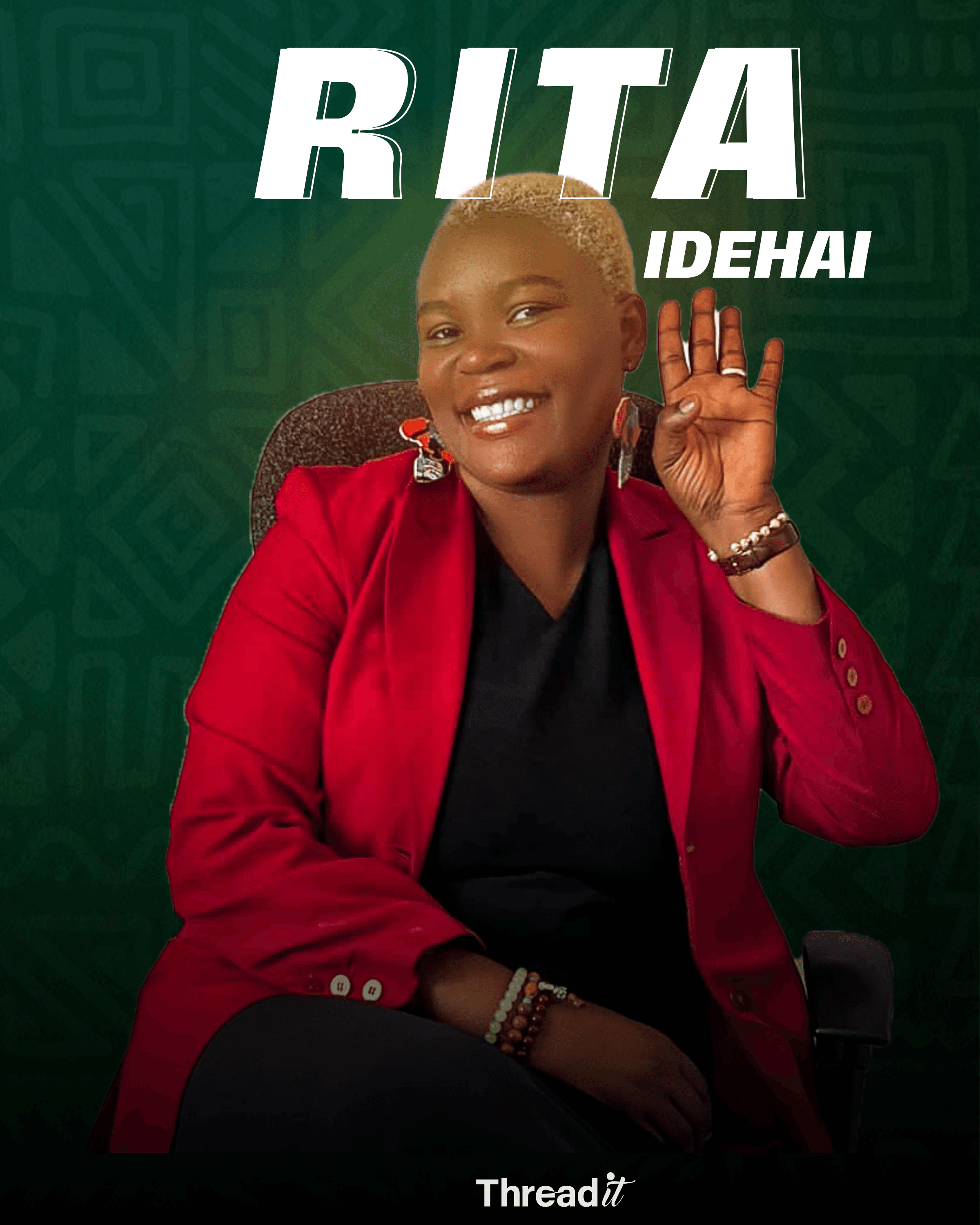
“Passion keeps you grounded, knowing that you have to start small and keep going. Resilience keeps you going even when you shut down.”__ Rita Idehai.
Rita Idehai ventured into waste management, vaguely aware of the intricacies of the largely informal sector, and with only the grit to make a lasting impact on the environment.
Through Ecobarter, her social enterprise, waste quite literally becomes currency: households can trade recyclable plastics for points to shop or convert them into cash. In the seven years since founding the company, Idehai has witnessed the possibilities within Nigeria’s recycling ecosystem, survived two near-closures, and participated in driving that change through innovation. Her work sits at the intersection of environmental responsibility and social justice, most notably through Nigeria’s first reverse vending machine for plastic and tin bottles, now operational in Abuja and parts of Lagos.
With Wrep by Ecobarter, the brand's upcycling and fashion production arm, Idehai extends that innovation into textile reuse, transforming discarded plastic bags into woven fabrics while empowering women in low-income communities who craft them into utility products.
In this interview with Threadit, she reflects on the hard-won lessons of building a circular economy in Nigeria, the quiet power of community partnerships, and how passion and resilience continue to shape her journey.
This interview has been edited for length and clarity.
With a background in geology and experience working in mining communities, there are both pragmatic and altruistic reasons to venture into social entrepreneurship. On one hand, to move away from oil and gas, and on the other, the desire to help reduce waste pollution. Which was more for you, social impact or the viability of the industry?
It's 100% social impact. I didn't know about the business side of the industry, and I had to trace the value chain. It was very vague, and I was uncertain. But I had the mindset of figuring it out on the way. Living and making positive social impacts is something I’ve always wanted to do, whichever way. So that has guided my personality.
When I was working in the mining industry and I began going up north, I saw how the people (in these communities) had so many resources but didn't even know the value of them. They didn't even have clean water. I felt that we were cheating them because we go to their land to take their resources, and they got nothing from us. I remember pitching for a CSR initiative, but that didn’t fly. I decided to go back and create my own business from it.
I did my research, and it was clear that I couldn't solve all the problems. Waste management seemed the easiest for me to start to make an impact. I also had worn-out clothes, shoes, and other household things that I was looking to trash. And because I was researching sustainability, I looked for recycling companies but didn’t find any. That was another point. The final one was during NYSC (National Youth Service Corps) when I saw a woman who had packed a lot of plastic bottles. I stopped and asked her a lot of questions and figured that this one plugged into a broader value chain. That was how Ecobarter basically started.
Ecobarter has weathered two crashes before it fully gained stability. After the second crash, diversification seemed like the direction to employ to absorb the vagaries of running a business. Was Wrep by Ecobarter always part of the Ecobarter diversification playbook, or did it come about by necessity?
That's a good question. In 2017, when I first decided, I didn't think that we would be just in the collection space. I thought about making plastic into products like T-shirts. But the equipment needed for a small-scale setup was too expensive.
When we launched publicly in February 2018 in Kuje – an outskirt of Abuja – it dawned on me very quickly that the area had lots of nylon (plastic bags) nobody was collecting. I had to collect them because if I were collecting only plastic bottles, I wouldn't be solving any problem there. It later became a matter of what to do with the nylon after collection. I saw some handicrafts to put a spin on it.
So, Wrep actually started barely one month after we officially launched, but it was just for us – internally training women and for community impact. We didn't first see it as a sustainable business option until it became clear that this was something valuable, and we also needed other means of revenue to absorb all the risks that came with recycling.
How has the project at Wrep by Ecobarter helped women in the margins? Statistically, what do fair wages look like to these women?
When we started, we had about 40 to 50 women we trained, and they worked with us for a while. These were low-income women, some of whom had never earned before. We went to their communities and trained them, and then also extended it to providing a workshop on how to commercialise. We pay them when they weave and when they go out to train other people. The people who sew also get paid. They consistently make over N60,000 monthly, even before the minimum wage increased. To give context, we pay N3,500 per yard of fabric that they make. In a month, a serious person can make about 20 yards. For those who sew, the average is about N2,000 per bag (for something like a tote bag or schoolbag).
In a year, a fabric weaver can do around four trainings, and that’s about N75,000 for each training. So, we've trained over a thousand women since 2018 across Abuja, Lagos, and Jos. We currently have 30 women working with us full-time, then another 20 women who work on a contract basis, especially those who sew. We also give them access to loans that they can pay back as they work. The waste pickers that we work with on the recovery side also have access to loans.
The biggest impact of this is economic empowerment, and this spills over [to other areas]. We had a case where one woman’s husband was being openly unfaithful, but she couldn’t do anything about it because she wasn’t contributing. When she first did the training, she told us that they used to laugh at her, that she was so jobless that she was now working in waste. When she started earning, the ridicule stopped. With another woman, the first time she was able to pay for her child's drug was when she earned from us. And she had been in an abusive marriage for a very long time. With her earnings, she was able to leave the marriage.
Generally, what is the production process like from start to finish?
We leverage our existing collection infrastructure here. First, we collect pure water sachets and single-use plastic bags from different sources: directly from households, from pure water companies, from shops like Shoprite. We then sort at our material handling centre and send it to different community workshops. Right now in Abuja, we have three functional workshops: two within the Kuje axis and one in the town.
The women come together to wash, disinfect, and then they select them based on the pattern that they're working on. They cut and reel, and then set up their loom with regular polyester threads. There are two categories of looms. One is a horizontal floor loom, and the other is just a vertical floor loom. On the loom, they warp it with synthetic fabric, and then weave in the cut nylon. It takes about a week to two, sometimes three, to finish. Once they’re done weaving, we collect the fabric, and then, depending on the orders that we have, the tailors make them into the product.
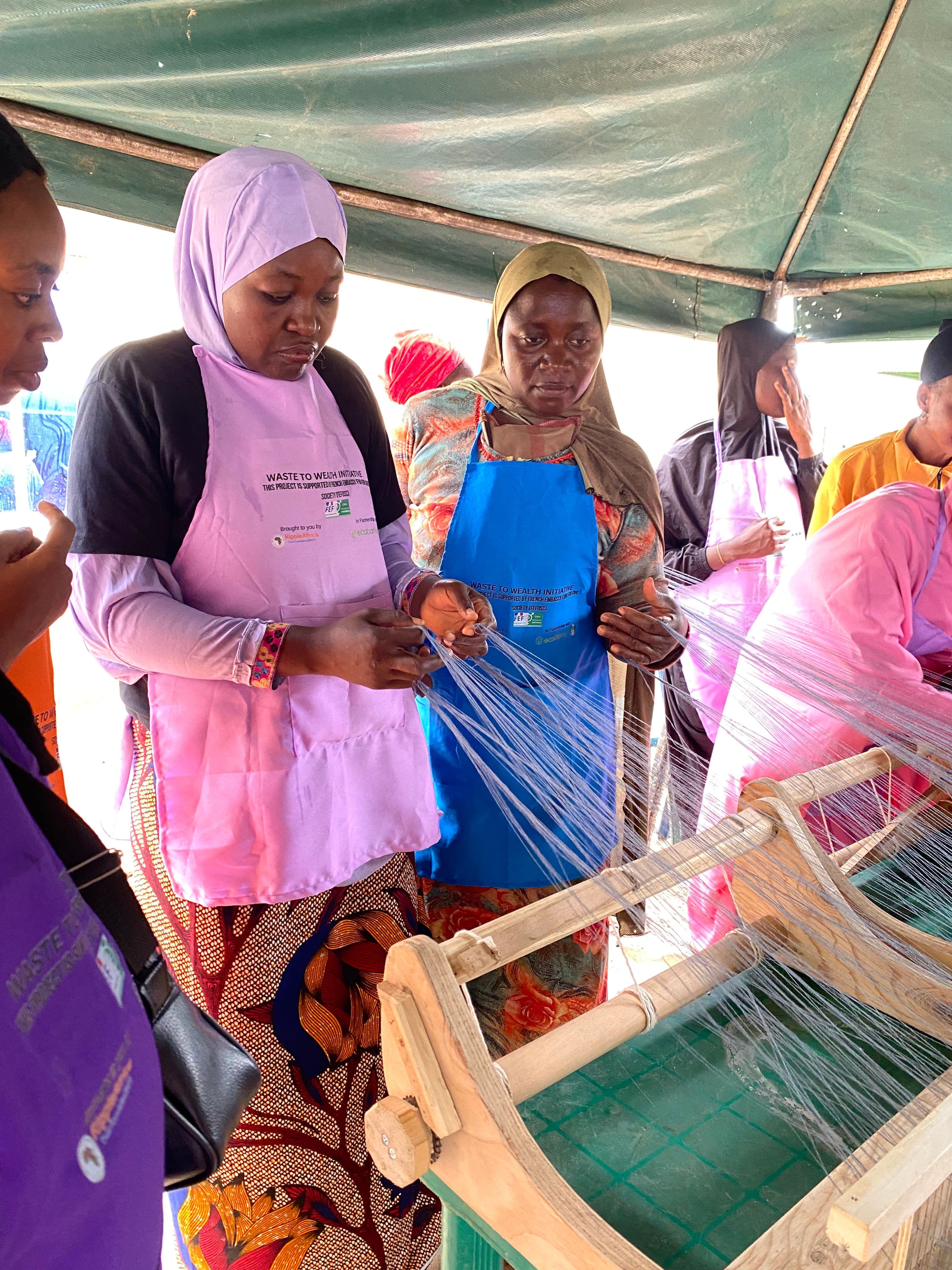
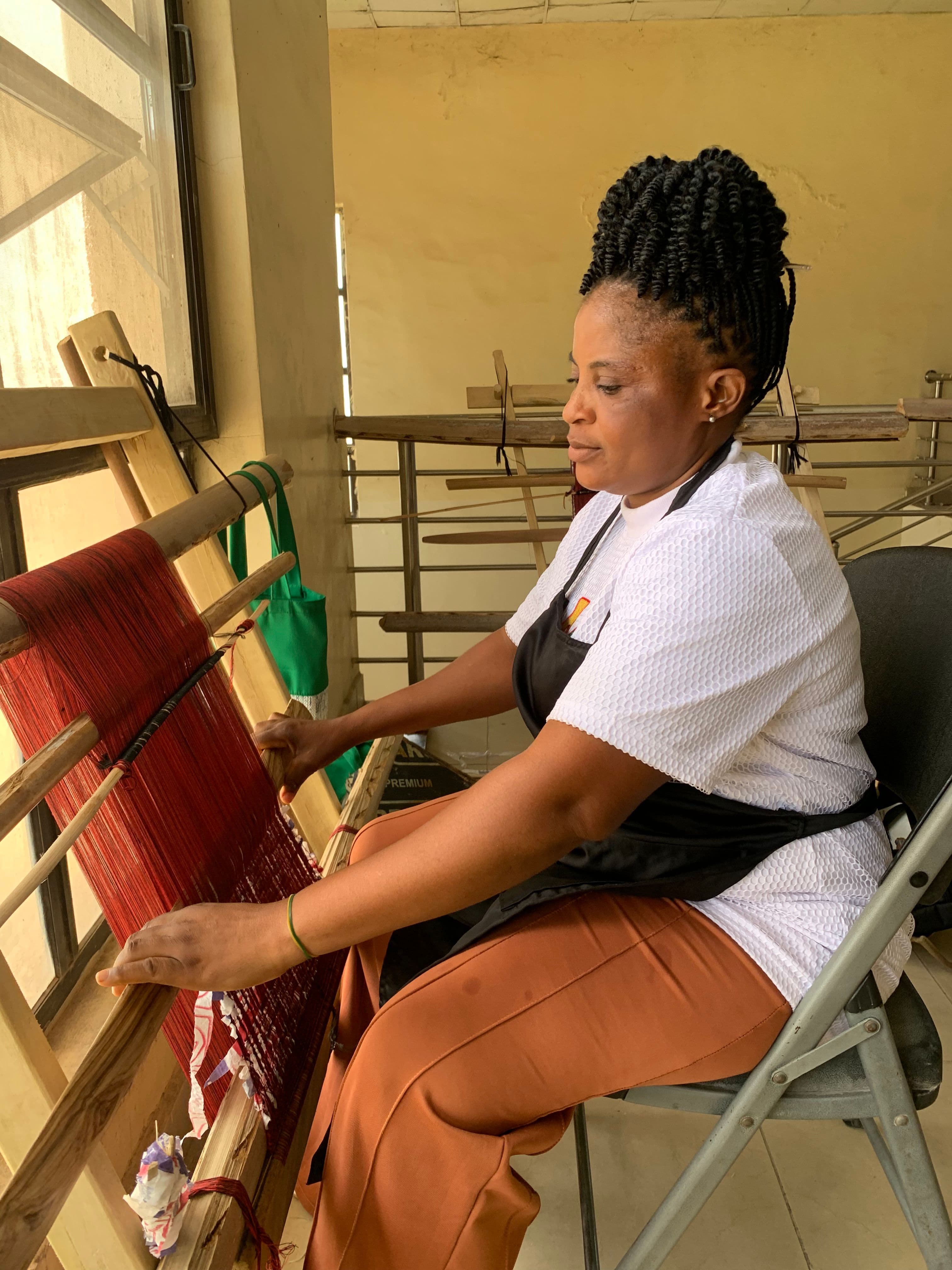
Ecobarter runs a system where they train low-income women to weave nylon, who then go on to train other women | Rita Idehai for Ecobarter.
The fabric is distinct, and the price points are fair as well. But what has been the public reception of the products? Do you market it as a niche product?
It’s dicey. People like the fabric. But we've not been able to translate that into sales as much. It wasn't until 2023 that we started to get the hang of it. I had to learn on YouTube in the early days because people who had weaving skills that I reached out to didn’t believe it was possible to weave nylon. It was only after I had learnt how to weave on my own via YouTube and made a sample product that these people then saw that it was possible, and one of them eventually agreed to train us professionally. I learned from him and then trained some other people who then trained others. The learning curve has taken a lot of time. It wasn’t until mid-2021 that we got fabric that was of good and consistent quality, and then by 2023, the point where the sewing is good.
With the fabric, too, it is very difficult to customise the colours. Because no matter what you do, what keeps the pattern is the nylon. And because we get nylons from our waste recovery, we can't decide the type of nylons that we get. For example, we can't get 10 yards of red nylon because we don't even know when we'll get that large a volume. But we have several sachet water companies that would give us that consistent flow of those nylons, but they do not look nice on certain colours.
This has limited how far we can sell. But we found our footing around bulk orders. That way, we moved a little bit away from fashionable items into just utility products. Say you are having a conference, you can do bulk tote bags or laptop bags. But earlier this year, we unveiled a new type of fabric which is now highly fashionable, and now we're going back into the fashion ring. The new fabric can be used in clothing. We’ve now launched a line of trousers, and it's doing well.
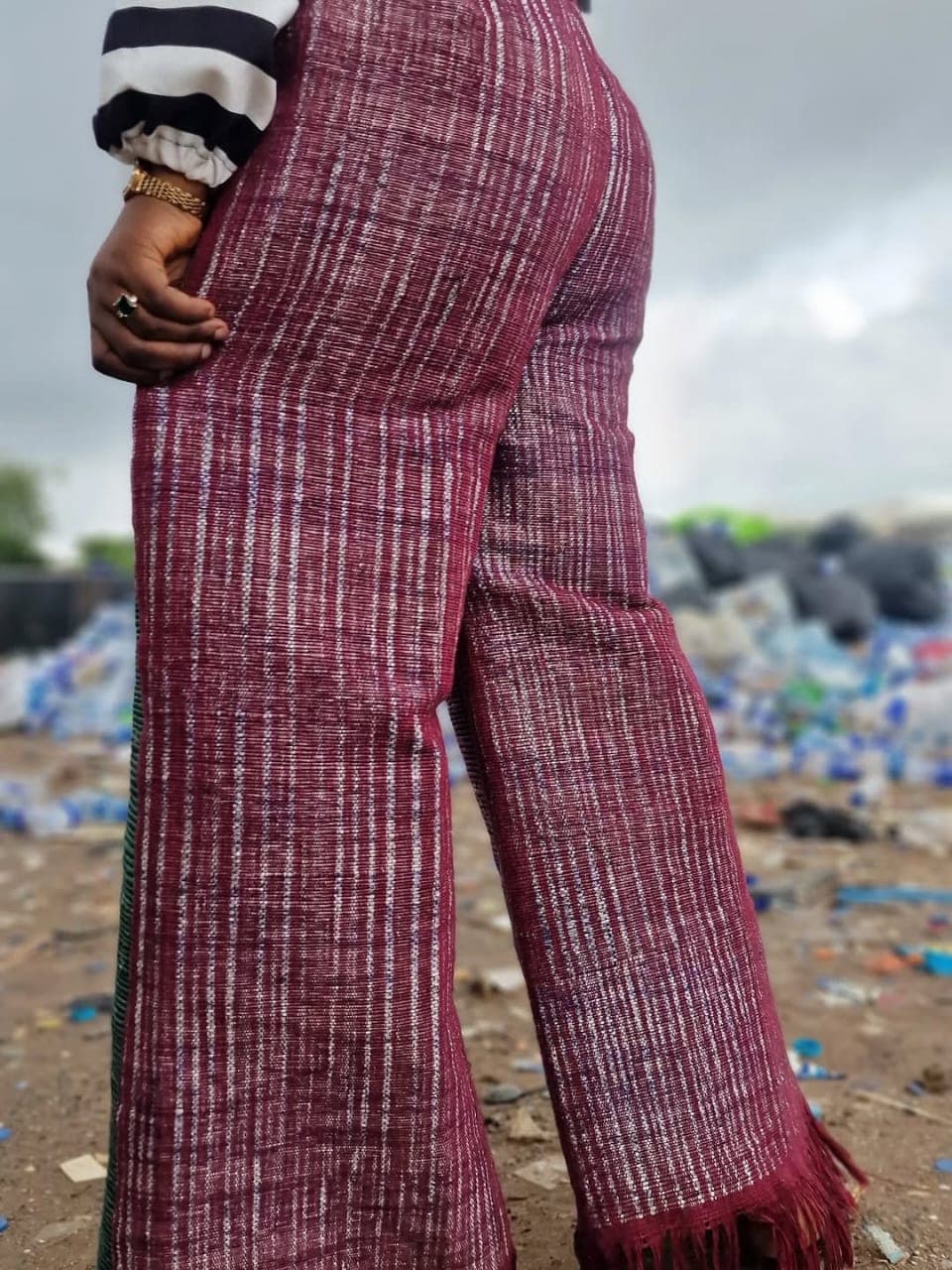
The newly launched Wrep trousers are both stylish and affordable | Instagram
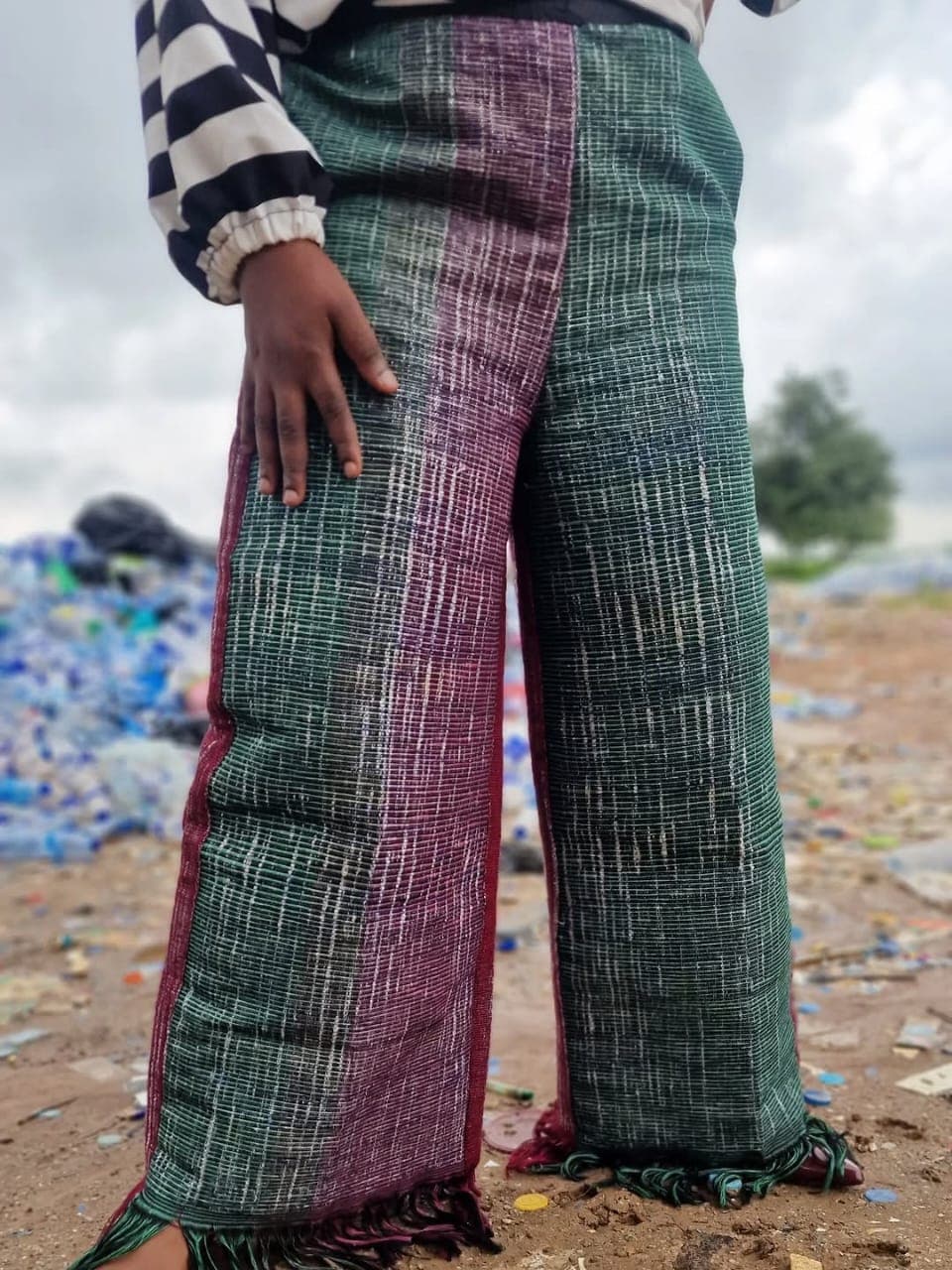
Are there any unsustainable practices that have evolved with Wrep by Ecobarter and with Ecobarter generally? And are there any ones that you intend to improve in the future?
Well, that would be more on the people management side and not on the environmental side. In the past, we took anyone from the community, which is why we have trained over a thousand, and we only have 30 people working.
We’ve evolved now. First, there has to be a local leader in the community who would speak on our behalf. We then explain to the women how demanding the job is and only train them if they show interest. We also ensure that the women already weave or have experience, or know how to knit, sew, or do embroidery. This has increased our conversion rate to 40%.
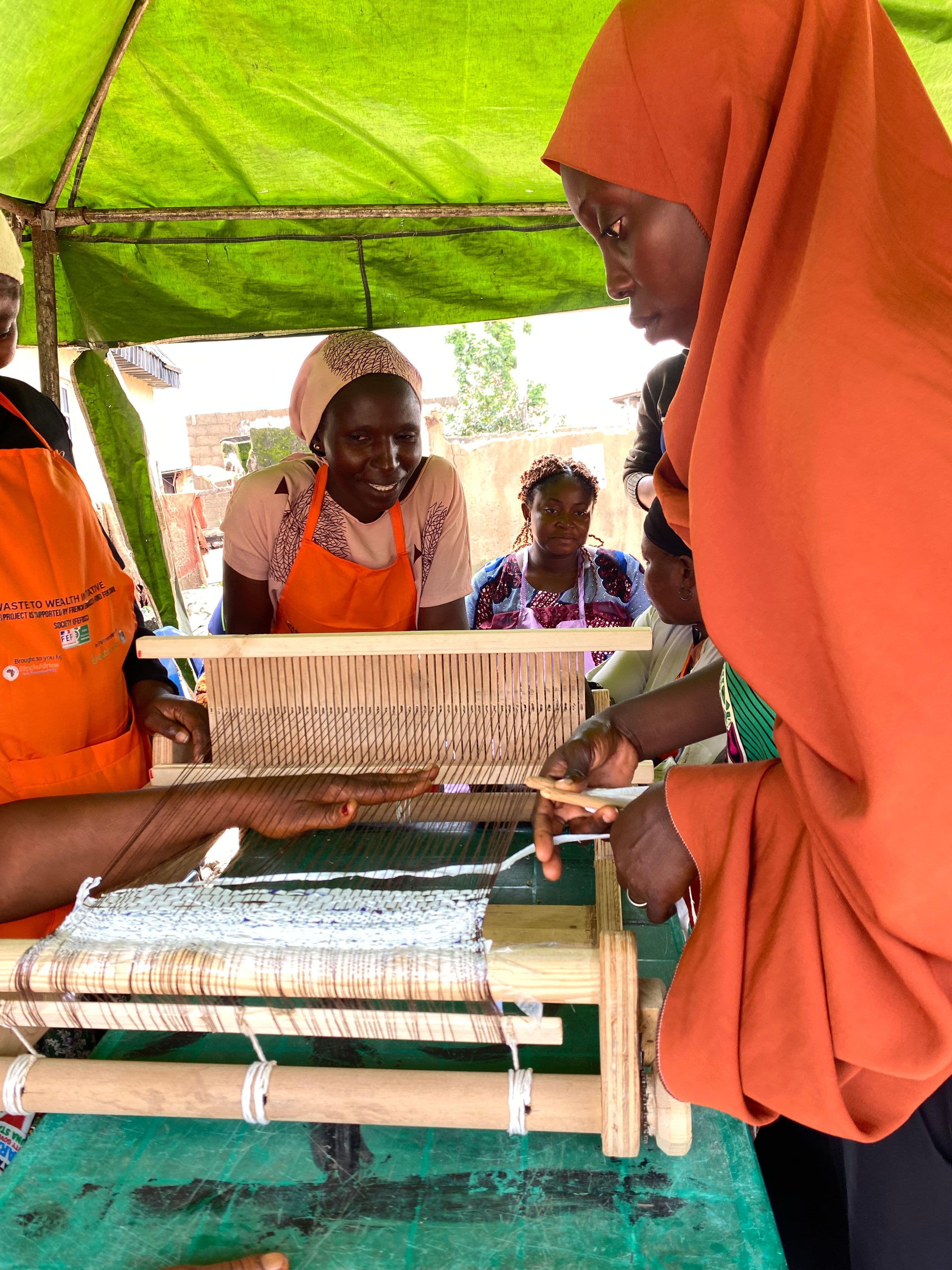

Women gather to train on looms and then go on to weave utility items like bags for Ecobarter | Rita Idehai.
It's been 7 years since the launch of Ecobarter. Part of the struggle is getting people more willing to recycle in the first place. Do you still struggle with this? And how do you continue to address it, especially with building trust in using the RVM?
Yes. In fact, acquisition is where we have the most challenge. Part of the problem is that people still view touching their waste as something beneath them. The RVM has made it look much nicer. Some people who have been to other countries where recycling is mandatory see the machine and commend it. So when they see similar infrastructure in Nigeria, it makes them happy, and they sign up to recycle with us.
But the reason why people have always looked down on recycling here is that it's largely informal. The easiest way people connect to it is the Bambabola (waste collectors), and we gladly accept it if it makes them understand. It's tough getting people to consistently recycle their waste because, so far, Nigeria doesn’t have the necessary infrastructure to make recycling compulsory. People still feel they are doing us a favour when we ask for their waste. And that’s what we’re trying to change with the RVM. We're seeing a few changes in attitudes, with people excited about the possibility of using the machine.
Ecobarter is mechanising, if not industrialising, the industry, especially with the Reverse Vending Machine (RVM). Does it pose a threat to this largely informal sector, or is there a synergy across sectors?
We are not trying to chase them out. We're only trying to bring some technology, infrastructure, and orderliness into the business. The way we are designed is to always identify stakeholders and choose to work with them, and we are very deliberate about working with people who are already informal waste workers.
In our collection structure, we have about 20 to 25 waste workers around our community that we provide training for. And even away from us, there are some that we still speak to on best practices. So we've not been able to work with them as much as we want to based on our design, but it’s still a learning curve. Right now, we are not working specifically with the informal waste workers already on the ground, but our system is open to anybody who wants to be an "agent," so to speak.
The RVM is not a novel invention, just one that has been innovated for Nigeria. It speaks to waste management interventions as a whole. Why is it important to employ sustainable actions that work best for Africa, instead of adopting Western-style solutions?
Whatever problem we're trying to solve is unique to us. We have a pollution problem, but we also have an infrastructural problem and a behavioural problem. The West has government policies mandated by law. Companies pay a cost for environmental pollution, so their reverse vending machines have a barcode on the bottles that indicates how much was paid for that bottle.
In Nigeria, we have to adapt the RVM in a way that, even though we don't have a policy that allows people to put money on the bottle they buy, we already have an informal market where we value the bottles based on the weights. So we had to design our machine to work based on weights and our agreed-upon value. Ours is solving the communication problem and the behaviour problem, because people now see the RVM as a cool equipment and they can just go and drop their bottles.
But there is a level that you cannot scale to without the right policies. We still need policies that would first mandate the Extended Polluter Responsibility Act, so companies can be taxed for the waste disposal or collection. That way, there’s enough money for recycling and collection. Also, better structuring the industry, as right now it’s mostly informal. Waste work is not recognised as a formal job in Nigeria, so we need to get to a place where we can recognise waste workers in a formal category.
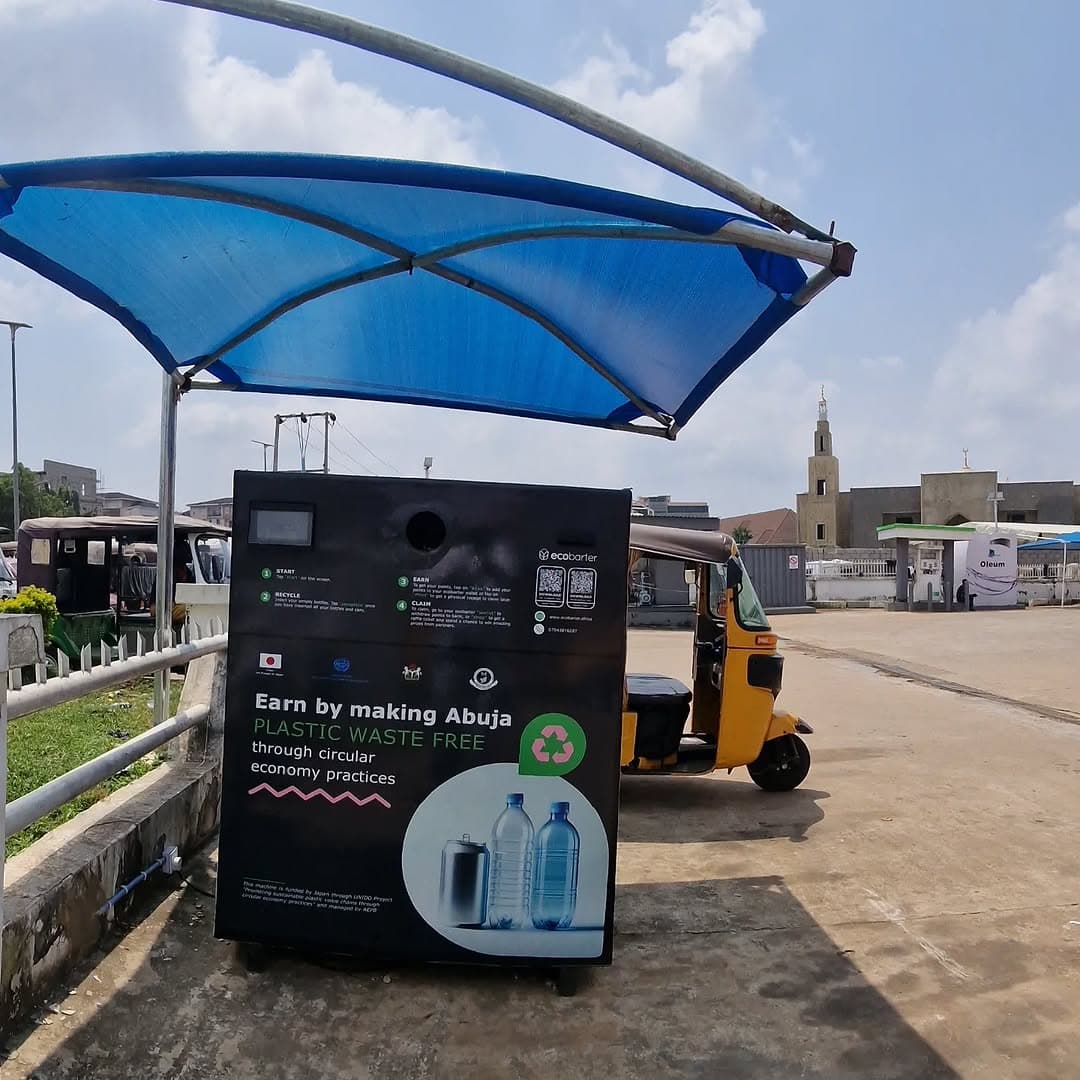
The Reverse Vending Machine at a collection point in Abuja | Instagram.
As an enterprise that has won several grants and impact funds, language, communication, and storytelling play a major role in getting funding. How does Ecobarter find a balance in talking about sustainability in a way that is not preachy or patronising?
We try not to take humanity away from the women. We state the problem as a matter of fact. For example, we might say that households do not have access to sustainable waste management, even though about 90% of the waste can easily be collected and transformed into new products, which is what we do. We then show the value, the impacts, and the results that we've achieved with our model. Before now, the dilemma was that we didn't have a lot of results to show. But even with the best impact story, that funding might just not be for you. We've turned in several applications this year, but the winning rate has been low.
Having now become an expert in the field, when would you recommend to be the right time to start a social enterprise, or even any business? Should one know a lot about the industry first or learn on the job?
I don’t think there’s ever going to be a right time, but there’s a right person. The right person is passionate and resilient. You are not kidding yourself that it will be an easy ride. You are very aware of how difficult it will be, and you’re ready.
Even if you get as much information as you can, nothing really prepares you for the reality, no matter the masterclass. Passion keeps you grounded, knowing that you have to start small and keep going. Resilience keeps you going even when you shut down. Just know that you don’t know anything and be prepared to learn.
Are there any other enterprises or projects that we should look out for from Ecobarter?
By 2026, we’ll make a lot more noise on Ecobarter Energy. That’s basically us collecting organic waste into biogas for clean cooking, and then some liquid fertilisers for small-scale farms.
Like Post
Comments
Anonymous679
10/31/2025I thoroughly enjoyed this piece❤️
Related Posts
MoreHow to Declutter Your Closet in Five Easy Steps
We’ve outlined five simple steps to declutter your wardrobe and embrace more sustainable fashion choices, helping you let go of clothes you no longer need.
Crocheting 101: Can We Outrun Fast Fashion Through Crocheting?
Learn how to make sustainable choices with crochet and discover whether crochet can truly outrun fast fashion.
Interview: Summer Chiamaka Anyanwu on Winning the Maiden Edition of Miss Green Fashion
Meet Summer Anyanwu, the Miss Green Fashion Queen, redefining sustainable fashion in Africa through purpose, leadership, and circular textile solutions.
Miss Green Fashion ‘25: Celebrating Beauty, Sustainability, and Impact
Miss Green Fashion is redefining beauty with purpose, promoting sustainability, creativity, and women’s empowerment.